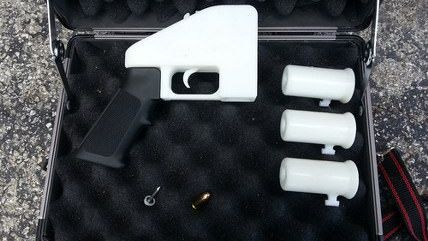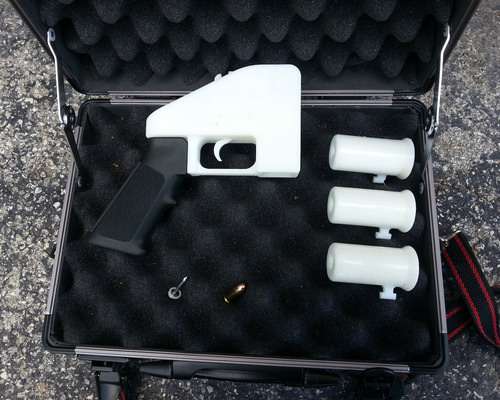Majority of Americans Would Ban 3D-Printing Guns at Home (Fat Chance!)


In results that may signal some discomfort with the enormous DIY promise of 3D printing and similar home-manufacturing technologies, a new Reason-Rupe poll finds that an otherwise gun control-weary American public thinks owners of 3D printers ought not be allowed to make their own guns or gun parts. Of course, implementing such a restrictive policy might be tad more difficult than measuring popular preferences.
First of all, Americans widely believe that ownership of 3D printers themselves should be unrestricted. The national Reason-Rupe telephone poll of 1,003 Americans asked:
Some Americans own 3-D printers, which can make a variety of plastic objects. Do you think Americans should or should not be allowed to use this technology in their own homes?
- Should 62%
- Should not 29%
- Don't Know/Refused (Vol.) 9%
- Total 100%
But, specific controversial uses are another matter. Just those who agree that Americans should be allowed to own 3D printers were then asked:
3-D printers can be used to make guns or gun parts. Do you think Americans should or should not be allowed to print their own guns or gun parts in their own homes?
- Should 44%
- Should not 53%
- Don't Know/Refused (Vol.) 4%
- Total 100%
So, even among people who think 3D printers should be allowed for personal use, just 44 percent say printing 3D guns or gun parts should be allowed.
However, there's little evidence that this 3D printed gun leeriness is part of a larger trend supporting restrictive firearms legislation. In fact, poll respondents seem sick of the issue in general, and ready for politicians to move on to something else. Reason-Rupe asked:
As you may know, the U.S. Senate recently voted down gun control legislation. Do you think the Senate should debate and vote on gun control legislation again or should the Senate move on to other issues?
- Vote on gun control legislation again 33%
- Move on to other issues 62%
- Both (Vol.) 1%
- Neither (Vol.) <1%
- Don't Know/Refused (Vol.) 3%
- Total 100%
While it's discouraging to both techno-enthusiasts and supporters of the right to self-defense that a majority of Americans favor restricting a specific use of 3D printers, there's no obvious path for implementing such a policy. While 62 percent support for permitting private ownership of 3D printers strikes me as surprisingly low (what would the results be for a similar question regarding photocopiers or drill presses?), that may well represent an element of discomfort with new technology that colors the overall results — and it's still overwhelming support for private ownership of 3D printers. And there's no practical way of limiting the use of the technology one it's in private hands.
Supporters of restrictions, such as Slate's Farhad Manjoo, have pointed to the technology that limits DVD players to DVDs from a specified region, or the technology that's supposed to prevent photocopiers, printers and graphics software from replicating U.S. currency, as examples to follow for 3D printers. But those controls are easier to implement — DVD players look for specific region markers, and currency comes with easily recognizable, two-dimensional images and tiny markers — and are still widely bypassed with ease. They're so easily bypassed, that 60 percent of counterfeit U.S. currency recovered in recent years was produced on ink-jet printers.
Now, how well would comparable software work to prevent the production of firearm designs that have yet to be created for 3D printers? How would such software reliably distinguish between guns and hose nozzles or mechanical replacement parts? And what if the designers were clever enough to break the file into two parts that together produced the components for a finished gun?
The fact of the matter is, no effective way exists of restricting the use of 3D printers. For those of us who believe that the home printing of firearms is only one aspect of the liberating power of decentralized manufacturing, it's very reassuring to know that the public will have long opportunity to get over its technophobia, and become accustomed to the idea that friends and neighbors might occasionally make a pistol at home with more ease than in the past, along with all of the other cool, prosperity-enhancing things they'll create with this new technology.
In the unlikely case that opinion further sours … Well, the RepRap project is developing 3D printers that can make more 3D printers that can make anything you want. It would be nice if the public were better attuned to the future. But the future is already here to stay.


Show Comments (66)